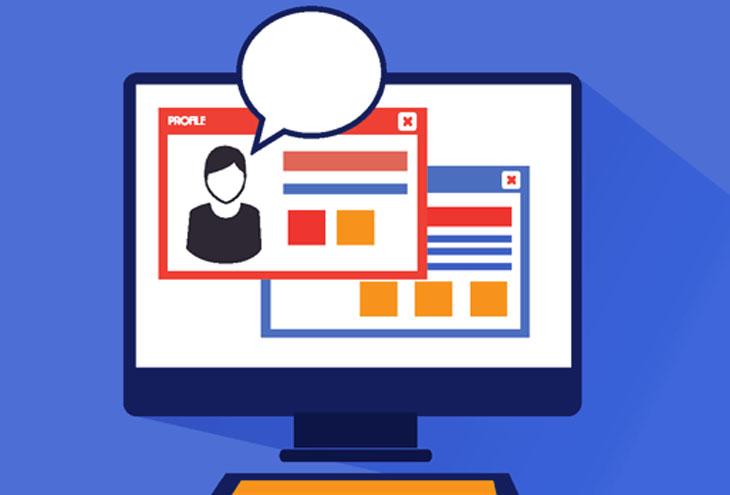Define your unique value proposition and market yourself in a digital world
Amazon founder Jeff Bezos is credited with saying your personal brand is “what people say about you when you’re not in the room.” In other words, it’s all about perceptions. Whether or not these perceptions are accurate, do most people know how they come across online? This article focuses on you professionals out there interested in updating your online brand as part of a larger strategy to find a new job or land a promotion. It provides suggestions for taking control and actively curating a digital persona that highlights to the world your unique traits and skills.
Establishing yourself online is one way to develop your brand. It’s also a relatively easy way to expand your professional network. After all, your brand is simply a way to market yourself, and the people you’ll want to reach with a message that touts your expertise and accomplishments and cultivates your career are likely already online and looking to build their own networks. Business management expert, author, and speaker Tom Peters said it well in his Fast Company magazine article “The Brand Called You”: “Regardless of age, regardless of position, regardless of the business we happen to be in, all of us need to understand the importance of branding. We are CEOs of our own companies: Me Inc. To be in business today, our most important job is to be head marketer for the brand called You.”
A solid first step into the online world, if you haven’t already taken it, is to create a LinkedIn profile. A complete profile takes some effort. It should include a recent professional photo, a headline (this doesn’t have to be simply your job title and company; consider customizing it to demonstrate your expertise), a summary (keep in mind keywords!), education and certifications, special skills, awards, and descriptions of your current and past positions. Recommendations you’ve given and received will also appear with your profile and offer additional insight for recruiters or potential employers into your workplace personality. Consider taking advantage of opportunities on LinkedIn to build your network and strengthen your brand. In addition to reaching out to others in your field with meaningful connection requests, join — and participate in — groups relevant to your field. Participation can range from “Liking” or commenting on content to posting your own articles, perspectives on the state of your industry, or a quick write-up of a recent development in your field. All are great ways to get noticed. One other item not to overlook: Make sure people can reach out to you! LinkedIn enables you to choose who can see your email address (first-degree connections, first- and second-degree connections, or anyone on LinkedIn).
In addition to a solid LinkedIn profile, you’ll want to establish additional ways for potential employers as well as others in your field to find you online. Do you have social media accounts that you use for work purposes? Do you blog? Have you considered creating a personal website? All these channels contribute to the brand that is you. Keep in mind, however, that more is not always better. Thousands of tweets are useless if the only ones to grab attention are inappropriate or hurtful. Careful consideration is a must before you post, tweet, comment, or even push the “Like” button. Prior to taking any action online, ask yourself, “Is this necessary? Will it negatively affect my reputation?” Participating purposely in social media is key. Fewer, thoughtful posts on these platforms carry more weight than do countless, hasty posts about nothing.
Of the numerous articles on personal branding, most focus on a critical theme: be authentic. And for good reason. Most phonies can be spotted right away, and representing yourself as anything other than what you are is an exhausting persona to maintain. Being the same person online as you are in real life allows you to connect with others in a real way, and enables you to build solid, honest relationships.
“The question,” according to a 2014 Forbes article, “is no longer if you have a personal brand, but if you choose to guide and cultivate the brand or to let it be defined on your behalf.” Developing a personal brand that reflects your true self takes time, and it will need periodic tune-ups, but the benefits are numerous: a chance to showcase your knowledge and skills and introduce yourself virtually to individuals who can benefit from that knowledge and those skills. Good luck!

Tara Astigarraga, Choctaw Nation of Oklahoma, is a senior software engineer, Blockchain Solutions, and master inventor at IBM Research. Here, Astigarraga, an AISES Sequoyah Fellow and recipient of the 2016 AISES Professional Award for Technical Excellence, offers her perspective on the importance of cultivating a personal brand as well as tips for developing or improving your own brand.
How do you define “personal brand”?
Your personal brand is what describes who you are, what you stand for, what makes you unique and different, and what you are known for. When someone mentions your name, it’s the overall impression and key points that people immediately think of. Your personal brand is often contextual; your brand as a person (how your friends and family would define you) versus your brand as a professional (how your co-workers, clients, and the corporate world would define you) are often unique but should still intersect and describe the whole of you. A personal brand is often divided into eminence (What are you known for?), presence (How do you present yourself?), and communication (How do you express your thinking?).
Why is a personal brand so important? What are the benefits?
Everyone has a personal brand. Whether you’re aware of that brand and are helping to define it is the question. If a person is aware of how others are perceiving them and what they are known for, they can help to reinforce or shift many of those perceptions going forward. When you have a strong personal brand, it warrants you credibility and a network that will help to propel your career. Additionally, when you have a strong personal brand, you will start getting invited to events that matter and that are aligned with your brand and career goals.
Are a personal brand and a social media or digital presence the same thing?
Your personal brand is definitely more than just your social media presence; it is inclusive of your social media/digital presence and your in-person presence, including your skills, background, network, communication style, appearance, and distinct experiences.
Can you offer some tips for someone who wants to develop or improve his or her personal brand and is unsure of where to start?
Ask yourself what you want to be known for. What skills, abilities, knowledge, attitude do you have (or are you developing) that will make people want to work with you (or follow/friend you online)? When people hear your name, what do you want them to think of and what do you want to be remembered for? Once you have this clear, you can start to reinforce those traits in your daily interactions and in your online communications. While it’s important to be authentic, understanding branding will help you to be both authentic and purposeful in your communications to control your personal brand and work toward personal and professional goals.
How often does a personal brand need to be reevaluated and updated?
Any time you make a shift in career goals or focus areas. If you’ve moved to a new project in an emerging technology space, it’s important that you update your personal brand to reflect that change in order to build your eminence, reputation, network, and credibility in that space. As your career goals and focus areas grow and shift, so should your personal brand.
Does anyone come to mind as an example of an impressive personal brander?
The name that comes to mind for me is John Herrington. While I do not know him personally, I have met him briefly at AISES conferences and have always been inspired by his in-person and digital presence, which is both clear and authentic. When I consider John and his personal brand, I immediately think: first Native American in space; strong advocate for AISES and Natives in STEM; approachable and caring person; mentor. If you’re not familiar with John Herrington, do a quick Google search. The results will give you a great example of a clear and strong personal brand.
Do you have any additional tips?
If you haven’t already, “Google” your name. If you have a common name you may need to add context (for example, “Tara Astigarraga + IBM”). Do you get return hits? If you do, does the information reflect the personal brand you envision for yourself? For your career, does it speak to your expertise? If it doesn’t, focus on the areas you want to highlight and publish blogs, articles, or other materials that begin to build and reaffirm your personal brand.














